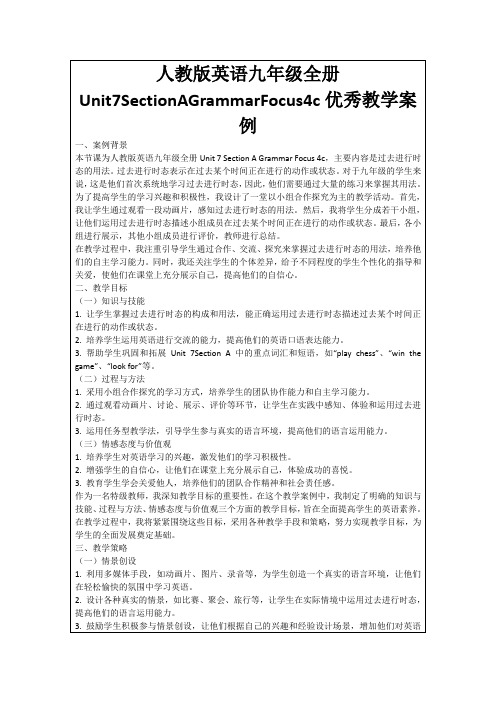九年级人教版英语Unit7SectionA语法总结
- 格式:doc
- 大小:630.00 KB
- 文档页数:22





人教版九年级英语第七单元Unit 7 section A 知识点精讲Section A单词1.license /'laɪsns/ n.(= licence)证;证件助记li/laɪ/ +cen/sn/+se/s/= license典例driver's license驾照business license营业执照拓展license vt.批准;许可2. safety / 'seɪfti/ n.安全;安全性助记safe(adj.安全的)+y(名词后缀)= safety典例Pay attention to the food safety, please.请注意食品安全联想safely adv.安全地3. smoke / sməʊk/ v.吸烟;冒烟n.烟典例Can I smoke in the dining hall?(动词)我能在餐厅里抽烟吗?Smoke is coming out of the chimney.(名词)烟正从烟囱里冒出来名言No smoke without fire.无风不起浪4.cry /kaɪ/ v.&n.哭;叫喊典例Mom, my little sister is crying all the time.(动词)妈妈,我的小妹妹一直在哭He heard a cry for help and rushed out.(名词)他听到一声呼救声,然后就冲出去了短语cry out大声呼喊5.field/fi:ld/ n.田野;场地典例in the fields在田地里on the football field在足球场上拓展field n.(某一)领域in the field of在…方面,在……领域6.hug /hʌg/ n.&v.拥抱;搂抱典例warm hugs(名词)温暖的拥抱hug tightly(动词)紧紧地拥抱注意hug的过去式和过去分词均为hugged,现在分词为hugging7. lift /lɪft/ v.举起;抬高n.电梯;搭便车典例He was too weak to lift his hand.(动词)他太虚弱了而无法抬起他的手。






Unit7 SectionA教材知识详解1. Teenagers should not be allowed to smoke. 青少年不应该被允许吸烟。
(1) allow意为“允许;许可〞,常用于“allow sb. to do sth.〞构造,表示“允许某人做某事〞。
allow后面可接动名词作宾语,不可用动词不定式作宾语,即:allow doing sth.“允许做某事〞。
例如:My father allowed me to play basketball after finishing my homework.我的父亲允许我做完家庭作业后打篮球。
They do not allow smoking in public. 他们不允许在公共场合吸烟。
归纳:用于被动语态时,必须接不定式作宾语补足语,不能接动名词形式,即:sb. / sth.+ be allowed + to do sth.构造。
也可在allow后面接介词短语,即:sb. / sth.+ be allowed + 介词短语。
例如:Women were not allowed to take part in the games.妇女是不允许参加这些比赛的。
I don’t allow dogs in the house.我不允许狗进屋。
(2) smoke表示“抽烟;吸烟〞,可用作及物动词,也可用作不及物动词;smoke作名词,是指燃烧中产生的“烟〞,用作不可数名词,在非正式用语中还可指“香烟〞,用作可数名词。
例如:It’s against the rules of the school to smoke. 吸烟是违反校规的。
The smoke from chimney is spreading out in the sky.烟囱冒出的烟正在空中散开。
No smoking. 制止吸烟。
2. Sixteen-year-olds should be allowed to drive. 16 岁的人应该被允许驾驶。





Unit 7单元知识清单Section A一、基础知识清单Words 1.license n.(=licence) 证;证件2.safety n.安全;安全性3.smoke吸烟;冒烟n.烟4.part-time adj.&adv.兼职(的)5.pierce v.扎;刺破;穿透6.earring n.耳环;饰7.flash n.闪光灯;闪光v.闪耀;闪光8.tiny adj;.极小的;微小的9.cry v&n.哭;叫喊?10.field n.田野;场地11.hug n.&拥抱;搂抱12.lift v举起;抬高n.电梯;搭便车13.badly adv严重地;差;非常14.awful adj;.很坏的;讨厌的15.teen n.(13至19岁之间的)青少年16.regret v &n.感到遗憾;懊悔17.poem n.诗;韵文munity n.社区;社团19.chance n.机会;可能性20.make one's own decision 自已做决定cate v教育;教导22.manage v完成(困难的事);应付(困难局面)Phrases 1.talk back回嘴;顶嘴2.keep··away from 避免接近;远离2.get? his driver’s ?license拿到他的驾照3.be ?worried about 担心4.I?don’t think我不认为5.be allowed to do sth 被允许做某事6.get her ear pierced?打耳洞7.make sure确保8.be allowed to do sth. 被允许做某事9.go out with sb. 和某人出去10.talk back顶嘴,回嘴?11.be late??迟到12.regret doing sth后悔做某事13.do social work for the community为社区做社会工作14.instead of sth/instead of doing sth代替15.keep sb away from使…远离…16.?give sb a chance to do sth给某人机会17.make one’s own decision(s)做某人自己的决定18.move out搬到外面(去住)19.take care of oneself照顾自己二、知识点清单知识点①:1.I?don’t?thinktwelve-year-oldsshould beallowedto gettheir earspierced.我认为不应该允许12岁的孩子穿耳孔。

Unit7Section AStudents are not allowedto drink and smoke.③be (not) allowed to do sth. (不) 被允许做某事例:Passengers are not allowed to smoke.不允许乘客吸烟。
3. I’m worried about your safety. 我担心你的安全。
(2) safety名词,意为“安全;安全性”,其常用短语in safety 意为“处于安全状态”。
例:I will answer for her safety.我将对她的安全负责。
The children are now in safety.孩子们现在安全了。
1. Teenagers should not be allowed to smoke.2. Sixteen-year-olds should be allowed to drive.3. Students should not be allowed to have part-time jobs.1)part-time jobs是合成形容词,意为“兼职的;业余的;非全日制的”,其反义词是full-time,意为“全职的;全日制的”。
例:In America many students are part-timeworkers.在美国,许多学生是兼职工作者。
(2)job可数名词,意为“工作”,指零散的、具体的工作。
其近义词为work,是不可数名词,其常用短语为at work,意为“在工作”。
例:He looked for work for several monthsand at last he found a job most suitablefor him.他一连找了好几个月的工作,最后找到了一份适合自己的工作。
4. Sixteen-year-olds should be allowed to get their ears pierced.get one’s ears pierced 意为“打耳洞”,此处get为使役动词,相当于make和have,意为“使;让”。
“get / have+宾语+过去分词”意为“使某事被做”或“让某人做某事”。
例:You’d better go and get your hair cut.it’s too long.你最好去把头发理了。
它太长了。
5.Teenagers should be allowed to choose their ownclothes.1)choose及物动词,其后可接名词或代词作宾语。
例:He chose a good job last year.去年他选择了一份好工作。
①choose to do sth.例:He chose to go there by air.他决定乘飞机去那里②choose+特殊疑问词+to do例:You will have to choose which one to buy.你将不得不选择买哪一个。
(2)own 此处用作形容词,意为“自己的;本人的”,常用在形容词性物主代词或所有格之后,以加强语气。
还可用作代词,意为“属于自己的东西”。
常用结构“one’s own +sth.”表示”某人自己的……”,相当于“sth.+of one’s own”。
例:This is your own duty. Don’t be angrywith others.这是你自己的责任。
不要迁怒于他人。
I want to have a big house of my own.我想有一所属于自己的大房子。
1. No way !没门No way 意为“不可能;决不;不行;没门”,多用于口语中,表示某人不可能做某事或某事不可能发生。
例:----Can I leave now? 我可以现在离开吗?----No way! 不行!1b1.Anna can go to the shopping centerby bus.2. Anna wants to get her ears pierced.3. Anna wants to choose her own clothes.1cA: I don’t think sixteen-year-oldsshould be allowed to drive.B: I agree. They aren’t serious(1)sixteen-year-olds名词,意为“16岁的青少年”,相当于sixteen-year-old boys and girls。
sixteen-year-olds,sixteen-year-old与sixteen years old.sixteen-year-olds“16岁的青少年”,是名词,在“基数词-名词(单数)-形容词”结构中,形容词后加-s表示一类人或事物。
例:Sixteen-year-olds should be allowed togo out at night.应该允许16岁的青少年夜间外出。
②sixteen-year-old“16岁的”,是由“基数词-名词(单数)-形容词”构成的复合形容词,在句中通常做前置定语,修饰名词。
例:My pen pal is a sixteen-year-old boy.我的笔友是一个16岁的男孩。
③sixteen years old“16岁”,用来描述人的年龄,常在句中作表语。
例:My brother is sixteen years old.我哥哥十六岁了。
2a1.Sixteen-year-olds should not be allowed to work at night.rry shouldn’t work every night.3.He should cut his hair.4. He should stop wearing that silly earring.(1)stop doing sth. 意为“停止正在做的事情”。
例:Let’s stop talking!让我们停止说话吧!2)stop to do sth 指停止手头所做的事情去做另外一件事情例:The two girls stopped talking when theysaw me.那两个女孩看到我时停止了讲话。
I stopped to talk to him when I saw him.我看到他时停下来去和他讲话。
(2)silly为形容词,意为“愚蠢的;傻的;可笑的”。
例:It was silly of you to trust him.你信任他,真是愚蠢。
5. He doesn’t seem to have many friends.=_____________Seem to do sth /it seems that2bIt looks cool.Young people need to sleep.He needs to spend time with friends.He needs time to do homework.It doesn’t look clean.2dSandy: I’m really excited about seeing thefamous paintings by Picasso. (1)be/get excited about意为“对……感到兴奋”,其中about后可接名词、代词或动词-ing形式。
例:She got excited about it as soon as she heardabout the good news.她一听到那个好消息,就变得很兴奋。
Are you excited about going to Shanghai?你对去上海感到兴奋吗?(2)excited意为“兴奋的;激动地”,主语常常为人。
exciting意为“令人激动的”,主语常为物。
例:We were very excited when we won thefirst prize.当我们赢得一等奖使,我们很激动。
The football match was very exciting.那场足球赛非常激动人心的。
Wu Lan: Me, too! I’m glad Mr. Smith chose theart museum for our school trip this year.Sandy: I’m going to bring my new camera totake lots of photos!Wu Lan: Oh, no. Mr. Smith says we must nottake photos. It’s not allowed in themuseum.Sandy: That’s too bad! Do you think we mightbe allowed to take photos if we don’tuse a flash?Wu Lan: Hmm ... I think they just want toprotect the paintings.So if you don’t use alight, then it mightbe OK.Sandy: Yeah. I think weshould be allowedto do that. I’ll bringmy camera anyway.3aMom Knows BestWhen I was a tiny baby crying all night, mymom sang to me and stayed by my side.(1)tiny (very small in size or amount)形容词,意为“极小的;微小的”。
例:The baby put his tiny hand in mine.那个婴儿把小手放在我的手中。
(2)cry此处用作不及物动词,意为“哭;叫喊”。
例:Don’t cry. Your mom is coming.别哭了!你妈妈来了cry可用作名词,意为“叫喊;大喊;哭”。
例:When he heard a cry for help, he run out as quickly as he could.听到呼救声,他尽可能快地跑了出去。
When I was tired and hungry, she gave me foodand warm arms to sleep in.When I was two running through the field, shemade sure I was safe and kept me from danger.When I fell and hurt myself, she gave me a hugand lifted me up.(1)hug( an act of putting your arms around sb. and holding them tightly)此处作名词,意为“拥抱;搂抱”。